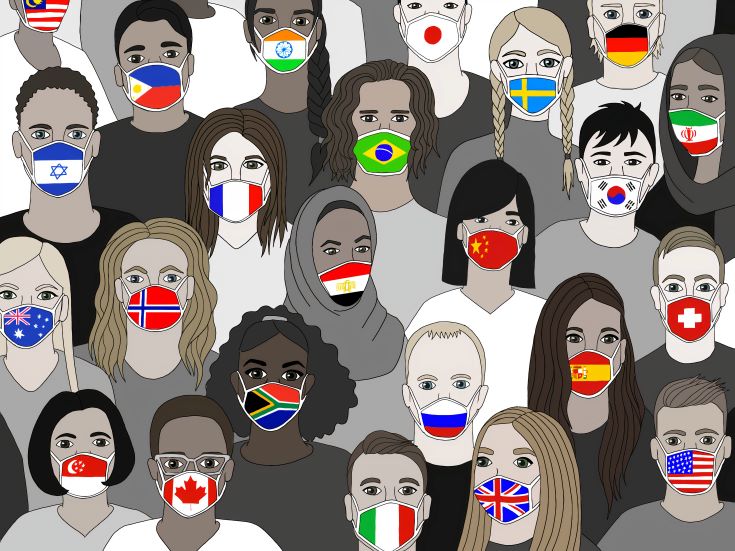Covid-19: WHO launches response evaluation
WHO Director-General, Dr Tedros Adhanom Ghebreyesus, has announced the initiation of the Independent Panel for Pandemic Preparedness and Response (IPPR) to evaluate the world’s response to the Covid-19 pandemic, reports Claire Sanders.

This illustration shows the power of togetherness, using images people from different Covid-19 affected countries. The facemask has become a symbol of protection during the pandemic. By imposing flag images on the masks it showcases the ongoing efforts made by affected nations to ensure the safety of their citizens. Image created by Laura Makaltses and submitted for United Nations Global Call Out To Creatives – help stop the spread of Covid-19/Unsplash
The independent evaluation will be co-chaired by former Prime Minister of New Zealand, Helen Clark and former President of Liberia, Ellen Johnson Sirleaf. Operating independently, they will choose other panel members, as well as members of an independent secretariat to provide support.
Clark went on to lead the United Nations Development Programme and President Sirleaf of Liberia is a recipient of the Nobel Peace Prize. “I cannot imagine two more strong-minded, independent leaders to help guide us through this critical learning process,” said Tedros in his speech at the member state briefing on the Covid-19 pandemic evaluation.
In an article in The Guardian, Clark is quoted saying: “The brief we’ve been given is, what do we need to stop the world being blindsided again by a crisis like this?”
She continues to outline how this pandemic has: “Gone beyond being a mere health crisis to being a full-blown health, economic and social crisis. And it will leave my country, like most others, with deficits which six months ago would have been thought of as inconceivable. So we have to do better.”
The Guardian reports that Clark sat down with the WHO Director General in Geneva in mid-February and she says Tedros felt “helpless” to stop the pandemic.
Announcing the evaluation, Tedros said: “After every outbreak in recent history, there are lessons that we have learned to protect ourselves better. And the world has made some progress in pandemic preparedness. But it is also clear that we have much more work to do
“For years, many of us warned that a catastrophic respiratory pandemic was inevitable. People from the health sector, even outside the health sector, and our leaders warned about a catastrophic pandemic.”
In his opinion, it was not a question of if, but when. “But still, despite all the warnings, the world was not ready,” he explains. “Our systems were not ready. Our communities were not ready. Our supply chains collapsed.
“It is time for a very honest reflection. All of us must look in the mirror – WHO, every member state, all involved in the response. Everyone.”
Tedros proposed that a special session of the executive board be called in September to discuss the panel’s progress. In November, the panel will present an interim report at the resumption of the World Health Assembly.
The executive board will hold its regular session in January 2021, where the panel’s work will be discussed further; and in May of next year, at the World Health Assembly, the panel will present its substantive report.
“This is a time for self-reflection, to look at the world we live in and to find ways to strengthen our collaboration as we work together to save lives and bring this pandemic under control,” commented Tedros. “The magnitude of this pandemic, which has touched virtually everyone in the world, clearly deserves a commensurate evaluation.”
The Director-General noted that the Independent Oversight and Advisory Committee for the WHO Health Emergencies Programme will also continue its existing work.
“Even as we fight this pandemic, we must be readying ourselves for future global outbreaks and the many other challenges of our time such as antimicrobial resistance, inequality and the climate crisis,” Tedros noted. “Covid-19 has taken so much from us. But it is also giving us an opportunity to break with the past and build back better.”
Tedros suggested that there is a need to review the performance of WHO’s national surveillance and response systems, how it shared information with its communities, and whether it earned their trust. He also recommended looking at how WHO is governed, and whether its global health architecture is fit for purpose.
But, he said, the most important question to ask is: “Are we ready to have an honest reflection, each one of us, everybody? Are we ready to learn the big lessons and can we honestly do it?”
He wants to put WHO forward like an open book so the panel can have full access and see what and how things were done, with member states opening up, too. Tedros emphasised that he is keen for this evaluation not to be: “Another blue-ribbon panel that issues a report that goes up on the bookshelf,” sayingthat it should be a global conversation and an opportunity to learn lessons and act on them.
Tedros believes that the greatest threat is not the virus, but the lack of leadership and solidarity at the global and national levels. “The virus thrives on division but is thwarted when we unite. My hope is that the defining crisis of our age will likewise remind all people that the best way forward – and the only way forward – is together,” he said.